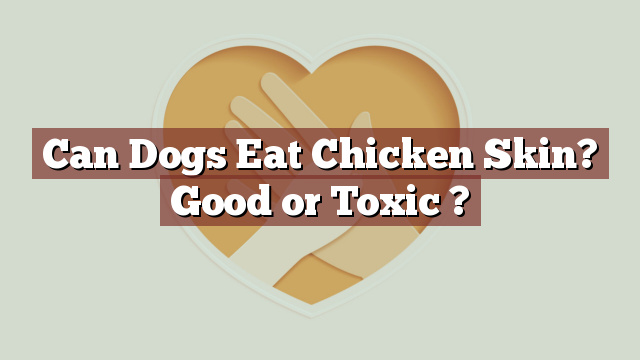Can Dogs Eat Chicken Skin? Good or Toxic?
It is essential for pet owners to be aware of the foods that are safe and suitable for their furry companions. Among the questions that often arise is whether dogs can eat chicken skin. In this article, we will explore the nutritional value of chicken skin, examine its safety and potential toxicity for canines, discuss the risks and benefits associated with feeding dogs chicken skin, and provide guidance on what to do if your dog consumes this food.
Nutritional Value of Chicken Skin: Proteins, Fats, and Minerals
Chicken skin is primarily composed of proteins and fats, making it a rich source of energy for dogs. It also contains essential minerals such as phosphorus and selenium. While it is important to understand the nutritional components of chicken skin, we must also consider the potential risks it poses to our four-legged friends.
Can Dogs Eat Chicken Skin? Exploring Safety and Toxicity
Dogs can eat chicken skin, but it should be given in moderation and prepared in a specific manner. While the protein and fat content can provide nutritional benefits, the high-fat content may not be suitable for all dogs, especially those with certain health conditions, such as pancreatitis or obesity. Additionally, the skin should be free from any seasoning, spices, or excessive salt, as these can be harmful to dogs.
Scientific and veterinary insights suggest that feeding dogs chicken skin on occasion is generally safe. However, it is crucial to monitor your dog’s response to this food and consult with a veterinarian if you have any concerns about their health or dietary needs.
Potential Risks and Benefits of Feeding Dogs Chicken Skin
Feeding dogs chicken skin comes with both potential risks and benefits. The high-fat content of chicken skin can contribute to weight gain and digestive issues if consumed excessively. Dogs with pancreatitis or gastrointestinal sensitivities may experience discomfort or adverse reactions when consuming fatty foods like chicken skin. Therefore, it is important to exercise caution and moderation when including chicken skin in your dog’s diet.
On the other hand, chicken skin can provide a source of healthy fats and protein for active dogs. It also adds variety to their diet, which can be beneficial for their overall satisfaction and well-being. However, it is imperative to strike a balance and ensure that the dog’s diet remains balanced and nutritionally complete.
What to Do if Your Dog Eats Chicken Skin: Precautions and Advice
If your dog accidentally consumes chicken skin or you intentionally include it in their diet, there are a few precautions to keep in mind. Firstly, avoid feeding them the skin from fried or cooked chicken, as the added oils and seasonings can be harmful. Instead, opt for skin from boiled or roasted chicken. Secondly, always remove any excess fat or visible gristle before offering the chicken skin to your dog. Lastly, observe your dog closely after they consume chicken skin, looking for any signs of discomfort, indigestion, or allergic reactions.
If you notice any adverse reactions or have concerns about your dog’s health, it is recommended to consult a veterinarian. They can provide personalized advice based on your dog’s specific needs and dietary requirements.
Conclusion: Moderation and Consultation for a Healthy Canine Diet
In conclusion, dogs can eat chicken skin in moderation and when prepared properly. While it does offer nutritional value, it is important to be mindful of the risks associated with the high-fat content, particularly for dogs with certain health conditions. Always exercise caution, remove excess fat, and monitor your dog’s response to this food. As with any dietary changes, it is advisable to consult a veterinarian to ensure your dog’s diet remains balanced and aligned with their individual needs. By adhering to these guidelines, you can provide a healthy and enjoyable diet for your furry companion.
Thank you for investing your time in exploring [page_title] on Can-Eat.org. Our goal is to provide readers like you with thorough and reliable information about various dietary topics. Each article, including [page_title], stems from diligent research and a passion for understanding the nuances of our food choices. We believe that knowledge is a vital step towards making informed and healthy decisions. However, while "[page_title]" sheds light on its specific topic, it's crucial to remember that everyone's body reacts differently to foods and dietary changes. What might be beneficial for one person could have different effects on another. Before you consider integrating suggestions or insights from "[page_title]" into your diet, it's always wise to consult with a nutritionist or healthcare professional. Their specialized knowledge ensures that you're making choices best suited to your individual health needs. As you navigate [page_title], be mindful of potential allergies, intolerances, or unique dietary requirements you may have. No singular article can capture the vast diversity of human health, and individualized guidance is invaluable. The content provided in [page_title] serves as a general guide. It is not, by any means, a substitute for personalized medical or nutritional advice. Your health should always be the top priority, and professional guidance is the best path forward. In your journey towards a balanced and nutritious lifestyle, we hope that [page_title] serves as a helpful stepping stone. Remember, informed decisions lead to healthier outcomes. Thank you for trusting Can-Eat.org. Continue exploring, learning, and prioritizing your health. Cheers to a well-informed and healthier future!

